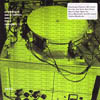 As Sub Rosa's venerable series of anthologies continues at a rapid pace they still continue to both cite important classic artists in the field as well as draw attention to those who may have been overlooked by the ravages of time. It takes a brave curator to put the likes of Claude Ballif and Charlemagne Palestine alongside Sutcliffe Jugend and Masonna, but the tradition of excellence continues.Sub Rosa
As Sub Rosa's venerable series of anthologies continues at a rapid pace they still continue to both cite important classic artists in the field as well as draw attention to those who may have been overlooked by the ravages of time. It takes a brave curator to put the likes of Claude Ballif and Charlemagne Palestine alongside Sutcliffe Jugend and Masonna, but the tradition of excellence continues.Sub Rosa Over the 87 year span that this disc covers, the artists and works here are as diverse as expected given the wide berth of the artform that is presented. However, the set seems more highly polarized into the earlier experimentations from the late 1950s into early 1960s (Francois-Bernard Mache, Richard Maxfield, Helmut Lachenmann, among others) and to artists within the past 10 or so years. (Personally, I would like to see more work from the '70s and '80s included, as I think there is a notable period of development then as well, but that's just me.) The earliest recordings are consistent with those early experimentations: prototype oscillator swoops, basic electronic tones and cut up/spliced magnetic tape collages. It is definitely noteworthy to hear such techniques that have been used for so long here in their nascent stages: the rhythmic cut up junk splices of Wolf Vostell's "Elektronicher de-collage. Happening Raum" are definite forbearers of Merzbow's early flirtations with junk loops and Dada collages. The long "Luminere (Part 1)" by Dub Taylor also demonstrates what is now labeled "noise" in its earliest forms: spliced up cuts of found sound, pure noise, and early synthesizer experimentation.
For the duration of most of the second disc, there is more of an overarching theme that shows the development of voice from pure experimentation into sheer noise, culminating with the harshest of modern day noise. The early poetry of Vladimir Mayakovsky and Raoul Hausmann demonstrate a tradition from words into pure oral sound. This is expanded by Gil Joseph Wolman and Leo Kupper, the latter's "Electro-poeme" especially is a rhythmic piece of live improvisations from 12 young people, making pure noise with their mouths without the aid of studio structuring or treatments. With these tracks placed together in this context, it is easy to see it is almost noise a cappella: noise made using the oldest and most basic instrument around, the mouth.
The modern developments of this attention to voice come at first in a more restrained context, a live run through of Pere Ubu's "Sentimental Journey" from 1978 focusing on David Thomas's tortured vocals, and Dajuin Yao's "Satisfaction of Oscillation," which uses more modern sampling technology to build songs out of the shortest of Mandarin Chinese words. The noise explosion begins on the one minute turntable/jazz freak-out of Ground Zero's "Live 1992," in which Otomo Yoshihide turntable torture is met with some of Yamatsuka Eye's best vocal spasms this side of early Boredoms and Naked City. However, this is almost quaint once the noise gets revved up.
The pure harsh noise end of the spectrum is ably represented by Takushi Yamazaki, better known as Masonna, and a recent track by power electronics duo Sutcliffe Jugend. The Masonna work is an excerpt of three tracks from the 1997 album Spectrum Ripper that, for all intents and purposes, could be from any of his releases. Not in a bad way, but he perfected his "seizure with a contact mic'd candy tin" style by this point, so there is a certain similarity in sound between this and, say Ejaculation Generater or Hyper Chaotic. His style is very well represented in this three and a half minute passage that most will either love or hate. The Sutcliffe Jugend track, "Blind Ignorance," is from their most recent This is the Truth album, and is among that disc's most harsh and violent works. As a band who manages to work on both sides of the "noise" versus "electronic music" spectrum, I find it interesting that their noisier side is the one chosen.
Again, both of these tracks show the development of the voice as an instrument of noise, Masonna’s manic shrieks and Kevin Tomkins’ angry yells are the centerpiece of their respective tracks. This subsection of the compilation ends on a more restrained note, Club Moral’s “L’enfer est Intime” from 1985 straddling that line between proto-industrial and current power electronics with DDV’s experimental vocals.
As previous editions, there is a wonderful accompanying book of liner notes and biographical information that provides a great background for the artists that are lesser known, as well as giving a good perspective on the tracks selected, and the reasoning behind the choices. As in the previous volumes of the set, the liner notes supplement the compilation well. I suppose it is inevitable that the choices in these compilations are beginning to get somewhat more obscure as the series wears on, and I am perfectly ok with that, it provides the opportunity to hear artists working in this field that may have not received the attention of a Pierre Henry or Francisco Lopez, but they are no less interesting. It does, however, make tracking down more works extremely difficult!
samples:
- Wolf Vostell - Elektronicher de Collage, Happening Raum
- Leo Kupper - Electro Poeme
- Sutcliffe Jugend - Blind Ignorance
Read More

